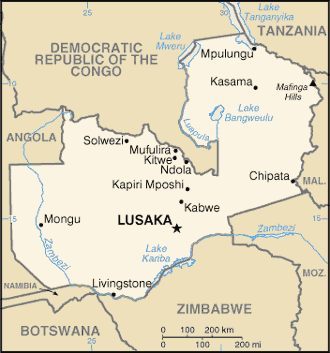Zambia

The Republic of Zambia has an estimated population of 13.2 million (UN, 2010). The capital is Lusaka. Zambia has an area of 752,614 sq km (290,586 sq miles). The main languages are English (official), Bemba, Lozi, Nyanga, and Tonga.
Zambia has been a relatively stable and peaceful country since it gained independence in 1962. From the 1960s until the 1980s, it was one of the most prosperous countries in Sub-Saharan Africa. Zambia was one of the world's third biggest copper miner producers. In 1975, the fall of copper prices devastated the Zambian economy.
The government’s efforts to advance gender equality are underpinned by customary law, which tend to determine women's rights in different settings. Women’s representation in decision-making positions is still low. In recent years, HIV/AIDS has become a major health problem in Zambia and women are especially vulnerable to HIV infection because of their subordinate position and the lack of control of their sexuality.
- Zambia ratified the Protocol to the African Charter on Human and Peoples' Rights on the Rights of Women in Africa (The Maputo Protocol) on the 2nd of May 2006.
- The Convention on the Elimination of All Forms of Discrimination against Women (CEDAW) was ratified by Zambia on the 21st of June 1985.
- Zambia has not yet adopted a National Action Plan on United Nations Security Council Resolution 1325 (UNSCR 1325).
- There are no former or current UN peacekeeping mandates in Zambia.
Source: BBC, AlertNet, CIA, UN, SIGI,
